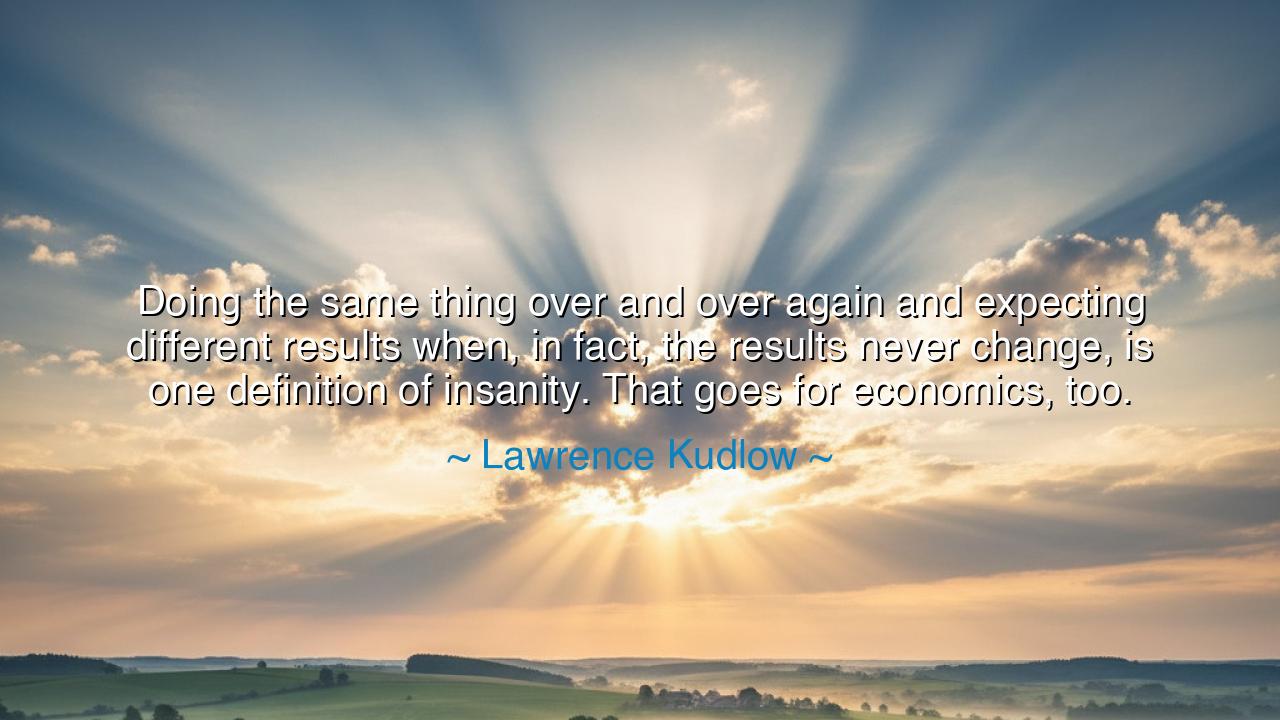
Doing the same thing over and over again and expecting different
Doing the same thing over and over again and expecting different results when, in fact, the results never change, is one definition of insanity. That goes for economics, too.






Opening Scene
The room is bathed in the soft, fading light of the evening. Outside, the hum of the city is beginning to quiet, the rhythm of the day winding down. Inside, Jack sits at the table, his fingers drumming lightly on the surface, his eyes distant, as though deep in thought. Jeeny stands by the window, her gaze fixed on the view below, her posture relaxed but contemplative. The stillness between them feels almost like a quiet pause, as though they’re both waiting for something to shift.
Host: After a moment of silence, Jeeny turns from the window, her voice breaking the stillness with a thoughtful tone.
Jeeny: “You know, I came across this quote by Lawrence Kudlow that really got me thinking. He said, ‘Doing the same thing over and over again and expecting different results when, in fact, the results never change, is one definition of insanity. That goes for economics, too.’ It made me wonder — how often do we do that in life? Keep repeating the same patterns, expecting different outcomes, but never truly changing anything?”
Jack: “It’s funny, because we often hear that quote in the context of personal habits or behavior, but Kudlow’s bringing it into economics, which feels even more telling. The idea that we keep applying the same solutions to complex problems, expecting different results, is such a vicious cycle. It’s like we don’t learn from our mistakes or evolve with the changing environment.”
Jeeny: “Exactly. It’s like we're stuck in this loop where nothing really changes because we’re not willing to try new approaches. We’re comfortable in the pattern, even when it’s clear that it’s not working. Whether it’s in economics or in our personal lives, we can easily get trapped in these routines, thinking that if we just push through a little harder, things will eventually shift. But the truth is, without real change, the results are always going to be the same.”
Jack: “It’s like we’re afraid to disrupt the cycle. I mean, we know deep down that something needs to shift, but instead of stepping back and reassessing, we just keep repeating the same actions, hoping that this time it’ll be different. It’s a form of self-deception.”
Host: The conversation feels heavier now, as though they’re beginning to dig into the deeper implications of Kudlow’s words. Jack leans forward, his fingers resting on the edge of the table, clearly processing the idea. Jeeny walks over and sits across from him, her eyes steady, as if encouraging the reflection to deepen.
Jeeny: “It’s almost like we’re so afraid of failure, or of the unknown, that we keep relying on what feels safe, even if we know it’s not working. We hold on to old solutions because they’re familiar, even though the world around us is changing. The real challenge is letting go of the past, letting go of what’s comfortable, and being open to new ways of thinking and acting.”
Jack: “Yeah, and that’s what makes it so tough. It’s easier to stick with what we know, even if it’s not yielding the results we want. Changing our approach requires a leap of faith, and it forces us to face the possibility of failure in a new way. But that’s also where growth happens, right? When we’re willing to try something different, even if it’s uncomfortable.”
Jeeny: “Exactly. And I think it’s not just about doing something different, it’s about doing something thoughtful, something that’s aligned with where we are now. It’s about making a conscious decision to break the cycle and innovate, instead of just hoping that doing the same thing will somehow work out.”
Jack: “It’s about evolving, really. Whether in economics, business, or personal growth, we can’t expect things to magically change if we’re not willing to challenge the status quo, to approach things from a new angle. Otherwise, we’re just in a cycle of insanity, expecting different results from the same actions.”
Host: The room feels quieter now, as if the weight of the conversation has settled in. Outside, the world continues its rhythm, but inside, Jack and Jeeny share a moment of clarity. The idea that change requires both a willingness to let go and an openness to new paths feels profound. They sit for a moment in comfortable silence, reflecting on the realization that the true path forward lies in breaking out of cycles, in embracing new ideas, and in taking intentional steps toward real transformation.
Jeeny: “So, maybe the real lesson here is this: if we want change, if we want growth, we can’t keep doing the same thing over and over. We have to be willing to rethink the problem, to approach it from a new perspective.”
Jack: “And that’s true in so many areas of life. Whether it’s personal habits, business, or even societal challenges, the key to moving forward is being willing to evolve, to make bold decisions, and to let go of what’s holding us back.”
Host: The conversation lingers in the room, like a quiet revelation. The world outside continues on, but inside, Jack and Jeeny are left with the understanding that true change doesn’t come from repeating what hasn’t worked. It comes from breaking the cycle, challenging old assumptions, and embracing the discomfort that comes with growth and innovation. Only then can we move forward, with purpose and clarity.






AAdministratorAdministrator
Welcome, honored guests. Please leave a comment, we will respond soon